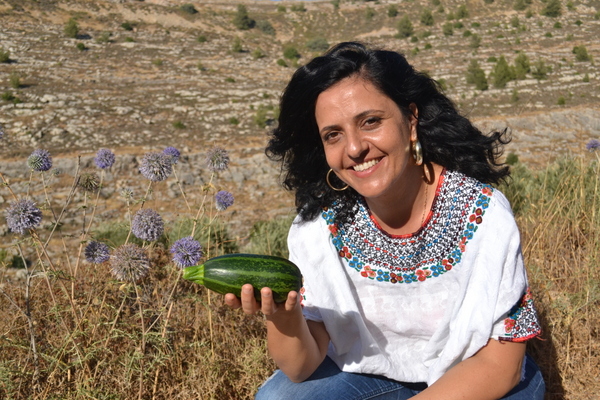The Green Planet Monitor

Green Planet Monitor Podcast
Here’s a story about a trip I took, some years ago, in the company of a Palestinian woman named Vivien Sansour. Vivien studied cultural anthropology in university. Since then, she’s become a champion for seed and food sovereignty in her native land.

Vivien Sansour (David Kattenburg)
Vivien and I drove from the Palestinian town of Beit Jala to nearby Battir. There, standing on the edge of a deep valley, I feasted my eyes on one of the world’s most astonishing sights: an amphitheater of ancient stone terraces covered in a cornucopia of fruits, vegetables, herbs and olive trees.
The engine of all this biodiversity? A very special microclimate. Also, a source of pure spring water that Battir’s eight extended families have been cooperatively managing for generations.
Battir’s gardens earned it World Heritage status from UNESCO back in 2014. “Endangered” status, no less. For years, Israel has been wanting to run its Apartheid Wall right across Battir valley, a move that would destroy it. Battir’s UNESCO status has put Israel’s plans on hold — for the time being.
Listen to this story in today’s podcast. Click on the link on top — or follow us on Blubrry.

Credit: Andrew S. Wright
For human beings, Earth is a supremely human place. A world of concrete, steel, glass, plastic, cars, paved streets and highways, and lots of other human beings, generating mountains of waste. Here and there, pockets of nature for human beings.
Dutch chemist Paul Crützen coined a term for Earth’s human age – the Anthropocene. Crützen proposed that it be declared a new ‘Epoch’ in Earth history, terminating the one geologists say we’ve been in for the past 12,000 years, the Holocene. Now, a scientific panel is about to shift Crützen’s proposal up a notch.
The Anthropocene Working Group (AWG) was set up by a subcommission of the International Union of Geological Sciences. Its task — defining the Anthropocene, geologically. Some time this Summer or early Fall, the panel’s proposal will be submitted to its parent body, the Subcommission on Quaternary Stratigraphy.
Listen to this story in today’s podcast. Click on the link on top — or follow us on Blubrry.

Thijs van Kolfschoten in his lab (David Kattenburg)
Thijs van Kolfschoten is a member of that Subcommission. He’s a Professor Emeritus of palaeo- and archaeozoology at the University of Leiden, in the Netherlands. Thijs took me to his lab, filled with bones of all sorts. We spoke about early humans, and the Anthropocene idea.

Sleep Waves (David Kattenburg)
We all know sleep is critical for survival, and a lack of it can have dire consequences. A good night’s sleep certainly helps us function better during the day. But why exactly? Researchers are only now beginning to connect the dots between brain plasticity and the healing powers of sleep.
Listen to this story in today’s podcast. Click on the link on top — or follow us on Blubrry.






 Visit Podcast Website
Visit Podcast Website RSS Podcast Feed
RSS Podcast Feed Subscribe
Subscribe
 Add to MyCast
Add to MyCast